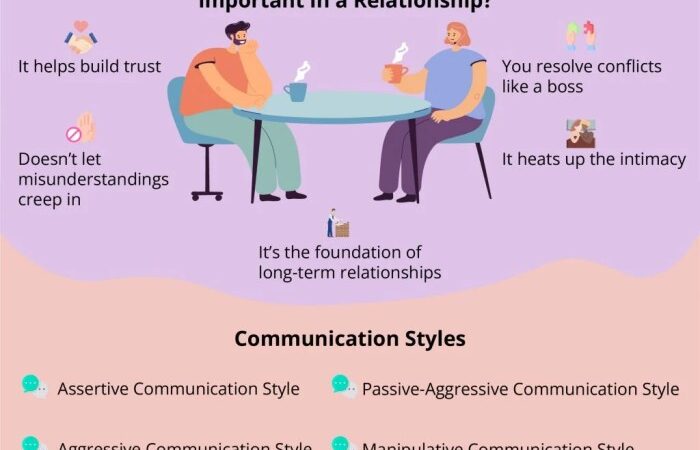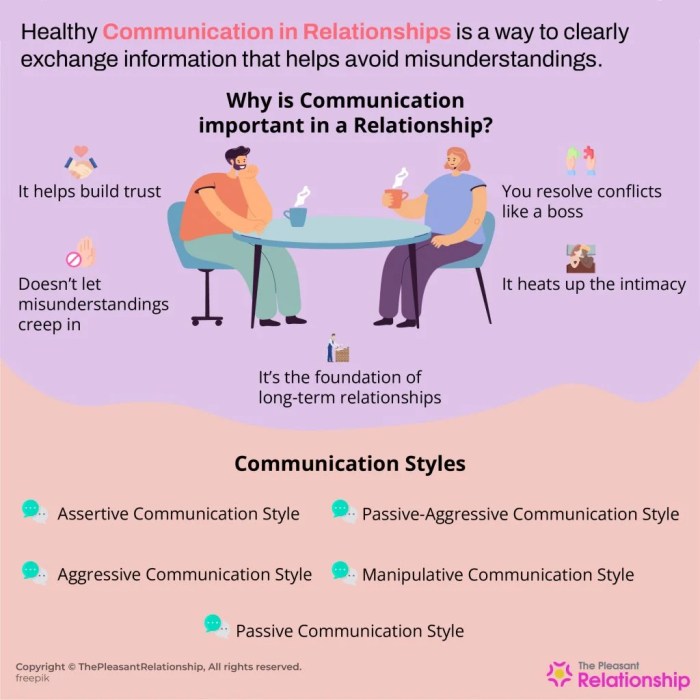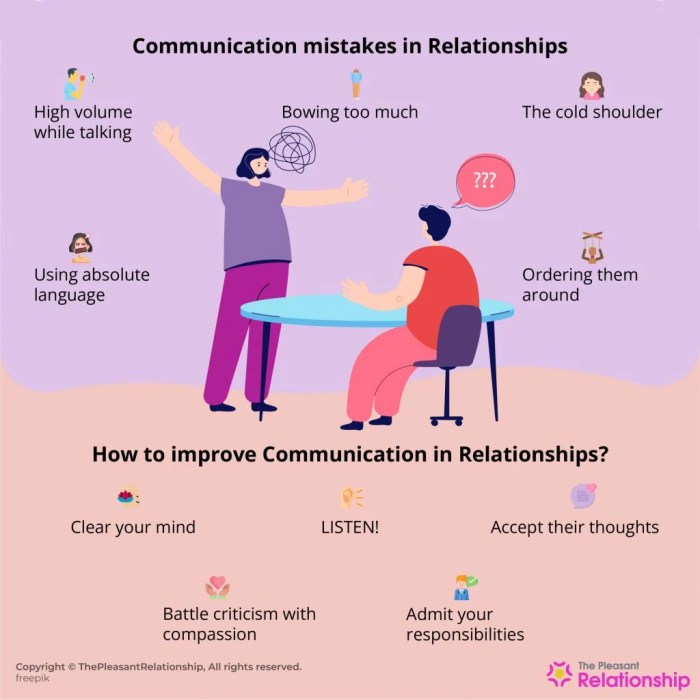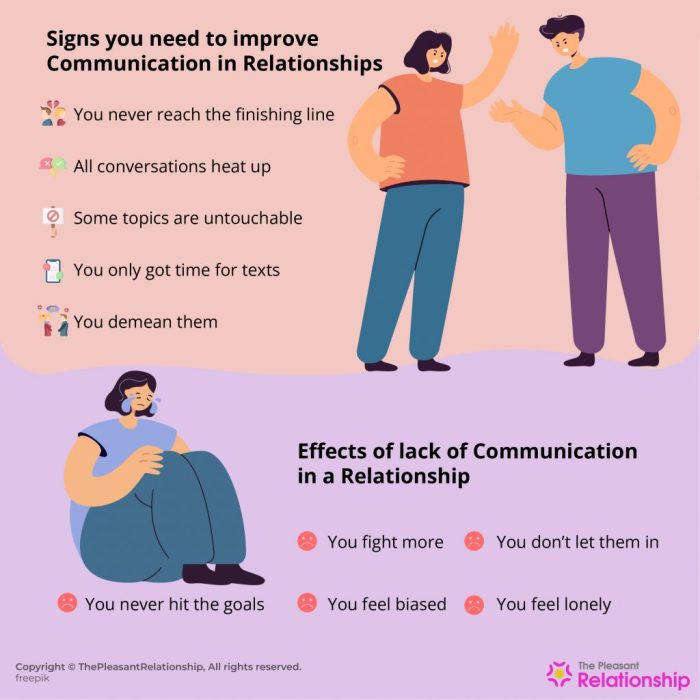Improve Communication in Relationships: Building Stronger Bonds

Improving communication in relationships is the foundation of a fulfilling and lasting connection. Understanding how we communicate, both verbally and nonverbally, can transform our interactions and foster deeper intimacy. From learning to express ourselves clearly and respectfully to navigating difficult conversations with empathy, this guide offers practical strategies for strengthening your relationships.
We’ll explore the different communication styles that shape our interactions, the importance of active listening, and common barriers that can hinder understanding. We’ll also delve into the power of emotional intelligence, providing tools to manage our emotions effectively and build a more secure and connected bond.
Understanding Communication Dynamics
Effective communication is the cornerstone of any healthy relationship, be it romantic, familial, or platonic. It is the bridge that allows us to connect, share, and understand each other. However, the path to effective communication is not always straightforward. Different communication styles, barriers, and dynamics can influence how we interact and how our messages are received.
Understanding these nuances is crucial for fostering a deeper connection and resolving conflicts constructively.
Communication Styles and Their Impact on Relationships
Each individual has a unique communication style, shaped by their personality, upbringing, and experiences. Recognizing these styles and their impact on relationships is essential for navigating interactions effectively. Here are some common communication styles:
- Assertive Communication: This style involves expressing your needs and opinions clearly and respectfully while also considering the perspectives of others. Assertive communicators are direct, confident, and able to set boundaries. They are good listeners and value open and honest communication. In relationships, assertive communication fosters mutual respect, understanding, and a sense of equality.
- Passive Communication: Passive communicators tend to avoid expressing their needs and opinions, often fearing conflict or disapproval. They may be agreeable, but they often feel resentful or unheard. In relationships, passive communication can lead to misunderstandings, bottled-up emotions, and an imbalance of power.
- Aggressive Communication: Aggressive communicators prioritize their own needs and opinions, often disregarding the feelings and perspectives of others. They may use harsh language, interrupt, and become defensive. In relationships, aggressive communication can create tension, and conflict, and damage trust.
- Passive-Aggressive Communication: This style combines elements of passive and aggressive communication. Individuals using this style may express their displeasure indirectly, through sarcasm, backhanded compliments, or silent treatment. In relationships, passive-aggressive communication can be confusing, create resentment, and make it difficult to resolve conflicts.
Understanding your communication style and that of your partner is crucial for effective communication. It allows you to identify potential areas of conflict and develop strategies for navigating them. For example, if one partner is more assertive and the other is more passive, they can learn to compromise and find a balance that works for both of them.
Active Listening and its Importance in Fostering Connection
Active listening is more than just hearing the words someone is saying; it’s about engaging with the speaker’s message on a deeper level. It involves paying attention to both verbal and nonverbal cues, asking clarifying questions, and reflecting on what you’ve heard. Active listening is crucial for building strong relationships because it:
- Demonstrates care and respect: When you actively listen, you show the other person that you value their thoughts and feelings. This fosters a sense of connection and trust.
- Improves understanding: By paying attention to both verbal and nonverbal cues, you can gain a deeper understanding of the speaker’s message, even if it’s not explicitly stated.
- Reduces misunderstandings: Active listening helps to clarify communication and prevent misinterpretations. This is particularly important when discussing sensitive topics or expressing strong emotions.
- Encourages open communication: When people feel heard and understood, they are more likely to open up and share their thoughts and feelings openly.
Active listening can be practiced by:
- Maintaining eye contact: This shows the speaker that you are engaged and paying attention.
- Nodding and using verbal cues: “Yes,” “I understand,” and “Go on” can encourage the speaker to continue.
- Asking clarifying questions: This shows that you are actively listening and trying to understand the speaker’s message.
- Reflecting on what you’ve heard: Paraphrasing the speaker’s message in your own words can ensure that you have understood correctly.
Common Communication Barriers and Strategies to Overcome Them
Communication barriers can hinder our ability to connect and understand each other. Recognizing these barriers and developing strategies to overcome them is essential for improving communication in relationships.
- Assumptions: We often make assumptions about what others are thinking or feeling, which can lead to misunderstandings. To overcome this barrier, it’s important to ask clarifying questions and avoid jumping to conclusions.
- Distractions: When we are distracted by our phones, work, or other things, we are less likely to listen attentively. To overcome this barrier, it’s important to create a distraction-free environment and focus on the conversation.
- Defensiveness: When we feel attacked or criticized, we may become defensive and shut down communication. To overcome this barrier, it’s important to listen to the other person’s perspective without becoming defensive and to express your thoughts and feelings calmly and respectfully.
- Mind Reading: We often assume that our partners know what we are thinking or feeling without explicitly communicating it. To overcome this barrier, it’s important to be clear and direct in our communication and to ask for what we need.
- Emotional Flooding: When we are overwhelmed with emotions, we may have difficulty communicating effectively. To overcome this barrier, it’s important to take a break from the conversation if needed and to return to the discussion when we are calmer and able to communicate more rationally.
Cultivating Effective Communication: Improve Communication In Relationship

Effective communication is the foundation of any healthy relationship. It’s not just about exchanging information; it’s about understanding each other’s perspectives, needs, and emotions. Cultivating effective communication requires conscious effort and a willingness to learn and grow together.
Expressing Needs and Desires Clearly and Respectfully
Clearly and respectfully expressing your needs and desires is crucial for fostering understanding and preventing misunderstandings. When you communicate your needs directly, you allow your partner to understand and respond appropriately. Here are some practical tips for expressing your needs and desires effectively:
- Use “I” statements: Instead of blaming or accusing your partner, focus on how their actions make you feel. For example, instead of saying “You always forget to take out the trash,” try saying “I feel frustrated when the trash isn’t taken out because it makes the house feel messy.”
- Be specific: Avoid vague statements like “You never listen to me.” Instead, provide specific examples of what happened and how it made you feel. For example, “I felt unheard when I tried to talk to you about my day yesterday, and you kept looking at your phone.”
- Choose the right time and place: Avoid discussing sensitive topics when you’re both stressed or tired. Find a time when you can both focus on the conversation and listen attentively.
- Be open to feedback: Be willing to listen to your partner’s perspective and try to understand their point of view. Even if you don’t agree, acknowledge their feelings and strive for a respectful dialogue.
Providing Constructive Criticism and Feedback
Constructive criticism and feedback can be valuable tools for personal growth and relationship improvement. However, it’s essential to deliver it in a way that is both helpful and respectful. Here’s a guide for providing constructive criticism and feedback in a relationship:
- Focus on behavior, not personality: Instead of attacking your partner’s character, focus on specific behaviors that you’d like to see changed. For example, instead of saying “You’re so inconsiderate,” try saying “I felt disregarded when you didn’t ask me about my day before starting your conversation.”
- Use a calm and respectful tone: Avoid using accusatory language or raising your voice. Instead, speak calmly and respectfully, even when you’re feeling frustrated.
- Offer solutions: Don’t just point out problems; suggest possible solutions or ways to improve the situation. For example, instead of saying “You never help around the house,” try saying “I would appreciate it if we could work together to create a chore schedule that feels fair to both of us.”
- Be open to compromise: Be willing to listen to your partner’s perspective and find a solution that works for both of you.
Empathy and Understanding in Conflict Resolution
Empathy and understanding are essential for resolving conflicts constructively. When you can see the situation from your partner’s perspective, you can better understand their motivations and feelings, even if you don’t agree with them.
- Active listening: Pay attention to what your partner is saying, both verbally and nonverbally. Try to understand their perspective and feelings, even if you don’t agree with them.
- Validate their feelings: Acknowledge your partner’s emotions, even if you don’t share them. For example, you could say “I understand that you’re feeling frustrated right now.”
- Focus on finding solutions: Instead of focusing on who’s right or wrong, work together to find a solution that addresses both of your needs.
Building Emotional Intelligence

Emotional intelligence is the ability to understand and manage your own emotions and to recognize and understand the emotions of others. It is a crucial aspect of healthy relationships, as it enables individuals to communicate effectively, build strong connections, and navigate conflicts constructively.
Components of Emotional Intelligence
Emotional intelligence is composed of several key components that work together to enhance our ability to understand and manage emotions.
- Self-Awareness: This involves being aware of your own emotions, understanding their triggers, and recognizing how they impact your thoughts and behaviors. It allows you to identify your emotional patterns and understand how they influence your interactions with others.
- Self-Regulation: This refers to the ability to manage your emotions effectively, controlling impulsive reactions and channeling your emotions in a constructive way. It involves learning to regulate your emotional responses and express your feelings appropriately.
- Motivation: This component focuses on your ability to direct your emotions toward achieving goals. It involves setting realistic expectations, maintaining a positive outlook, and staying motivated despite challenges.
- Empathy: This involves understanding and sharing the feelings of others. It requires actively listening, considering their perspectives, and responding with compassion and sensitivity.
- Social Skills: These skills involve effectively communicating and building relationships with others. It encompasses aspects like active listening, clear communication, conflict resolution, and building trust.
Recognizing and Managing Emotions Effectively, Improves communication in a relationship.
Developing emotional intelligence involves understanding and managing emotions effectively.
- Pay Attention to Your Body: Observe physical sensations associated with different emotions, such as increased heart rate, muscle tension, or changes in breathing.
- Label Your Emotions: Identify and name the emotions you are experiencing. This helps you gain clarity and understand their underlying causes.
- Explore Your Thoughts: Examine the thoughts that accompany your emotions. Are they rational or irrational? Do they contribute to your emotional state?
- Practice Mindfulness: Engage in mindfulness exercises to become more aware of your emotions and thoughts in the present moment, without judgment.
- Develop Healthy Coping Mechanisms: Identify healthy ways to manage stress and regulate emotions, such as exercise, relaxation techniques, or spending time in nature.
Emotional Intelligence and Communication
Emotional intelligence plays a crucial role in enhancing communication and intimacy in relationships.
- Active Listening: By being empathetic and understanding the emotions behind words, you can listen more effectively and respond with sensitivity.
- Clear and Assertive Communication: Emotional intelligence allows you to express your needs and feelings clearly and assertively, without resorting to aggression or passivity.
- Conflict Resolution: By understanding and managing your own emotions and those of your partner, you can approach conflicts constructively and find solutions that benefit both parties.
- Building Trust and Intimacy: Open communication, empathy, and understanding foster trust and intimacy, strengthening the emotional bond between partners.
Addressing Communication Challenges
Even with the best intentions and a strong foundation, communication challenges are inevitable in any relationship. Conflicts arise, misunderstandings occur, and emotions can run high. However, understanding how to navigate these challenges effectively is crucial for maintaining a healthy and fulfilling connection.
Different Approaches to Conflict Resolution
Conflict resolution strategies in relationships can be categorized into different approaches, each with its strengths and limitations.
- Avoidance: This approach involves ignoring or withdrawing from conflict. While it might seem like a temporary solution, avoidance can lead to resentment and unresolved issues.
- Accommodation: This strategy involves giving in to the other person’s wishes to maintain peace. While it can be helpful in the short term, accommodation can lead to feelings of being taken advantage of or resentment building up over time.
- Competition: This approach focuses on winning the argument and asserting one’s own needs over the other person’s. It can lead to feelings of hostility and damage the relationship in the long run.
- Compromise: This approach involves finding a solution that satisfies both parties’ needs to some extent. While it can be a healthy way to resolve conflict, compromise can sometimes feel like a loss for one or both parties.
- Collaboration: This approach involves working together to find a solution that meets both parties’ needs fully. It requires open communication, empathy, and a willingness to understand each other’s perspectives. Collaboration is often considered the most effective and healthy approach to conflict resolution.
Navigating Difficult Conversations and Managing Disagreements
Difficult conversations can be challenging, but some strategies can help couples navigate them effectively.
- Choose the Right Time and Place: Avoid having important conversations when either person is tired, stressed, or distracted. Find a quiet and comfortable space where you can both focus on the discussion.
- Focus on “I” Statements: Instead of blaming or accusing, use “I” statements to express your feelings and needs. For example, instead of saying “You always forget to do the dishes,” say “I feel frustrated when the dishes are left undone.”
- Active Listening: Pay attention to what your partner is saying, both verbally and nonverbally. Reflect on what you hear to ensure understanding and avoid misunderstandings.
- Take Breaks: If the conversation becomes heated, take a break to calm down and collect your thoughts. Agree to revisit the conversation later when you are both more composed.
- Seek Professional Help: If you find it difficult to communicate effectively on your own, consider seeking the guidance of a therapist or counselor. They can provide tools and strategies to improve your communication skills and resolve conflicts constructively.
The Role of Forgiveness and Compromise
Forgiveness and compromise are essential for maintaining healthy communication in relationships.
“Forgiveness is not forgetting; it is letting go.” C.S. Lewis
Forgiveness does not mean condoning hurtful behavior. It is about releasing resentment and bitterness, which can be detrimental to both individuals and the relationship. It allows for healing and moving forward.
Compromise involves finding a solution that meets both parties’ needs to some extent. It requires a willingness to be flexible and consider the other person’s perspective. Compromise can be a challenging but rewarding aspect of healthy relationships.
Final Review

By investing in improving communication in your relationships, you’re investing in the well-being of your connections. By practicing the strategies articulated in this guide, you can create a foundation of trust, understanding, and empathy, allowing you to navigate challenges, celebrate successes, and deepen your bond with those you care about most.
Comments are closed.